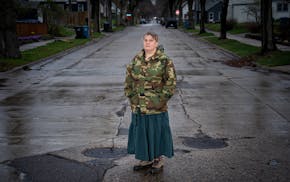If an employee at the Mayo Clinic Health System's Austin campus feels ill, help is just a few steps away, thanks to an experiment underway this month.
A kiosk outfitted with basic medical instruments and a high-definition video link has started taking patients for a new telemedicine project known as "Mayo Connected Care."
The kiosks, manufactured by HealthSpot of Dublin, Ohio, have been undergoing tests at Mayo since February, said Mark Ciota, the CEO for Mayo Clinic Health System sites in Austin and Albert Lea. The first patients were seen this month as the pilot program launched. For now it's available only to Mayo employees. Ciota said he expects to see kiosks at two, private employers in Austin after the first of the year.
It can take blood pressure, measure height and weight, and comes with a device to look into the patient's ear, throat and eyes along with a stethoscope. The kiosk closes up completely for patient privacy. An attendant stands nearby to help out if needed, and to sterilize the kiosk and medical equipment after each use. The plan would be to study the use of the kiosks for one year before expanding the program further, he said.
"We want to learn as much as we can about delivering care in this way," he said. "Our idea would be to put one of these in an employer setting, like a plant or large office area, so employees wouldn't have to leave work to get health care."
Ciota said a typical kiosk patient would be someone dealing with a minor ache or pain. Patients must first answer a series of questions designed to screen out more serious cases.
The experiment steps into a crowded marketplace of ideas for telemedicine, with smartphone apps and websites already setting up shop to substitute for a trip to the doctor's office. Even Google has plans to get in on remote health care, with the website Engadget this month reporting that the search giant confirmed that it plans to test out video chats with doctors for people searching for symptoms online.
The Mayo Clinic's Center for Innovation has run a pilot program for patients to Skype with doctors, and Mayo earlier this year launched the mobile app, "Better," in partnership with a venture-capital firm and a telemedicine entrepreneur. The program allows patients to tap Mayo's knowledge bank and symptom checker for free. A $49.99 per month subscription gives round-the-clock, family access to Mayo nurses, health care assistants and other professionals.
Apart from Mayo's offerings, the mobile app "Doctor on Demand" gives 15-minute, $40 doctor's visits by video. Blue Cross and Blue Shield of Minnesota offers video chats with their "Online Care Anywhere" program. And Bloomington-based Healthpartners has Virtuwell, launched in 2010, which doesn't include video, but connects patients with a nurse practitioner. A similar service launched in 2009, Zipnosis, is based in St. Paul and was first tested at Park Nicollet.
These kinds of "visits" are one to two years away from being a routine part of health care, said Tom Charland, CEO of Merchant Medicine, a health care research and consulting firm based in Shoreview. Telemedicine visits are typically cheaper than in-person checkups, and a large self-insured company might see the savings as a substantial benefit, said Charland.
"Because they're paying the bill, they're not paying the premiums, so any savings drops to the bottom line immediately," he said of self-insured companies.
Matt McKinney • 612-673-7329
One day in the frantic life of a Children's Minnesota emergency room nurse
State Sen. Nicole Mitchell off committee assignments while case under review

GOP endorses Tad Jude for congressional seat Dean Phillips is leaving
